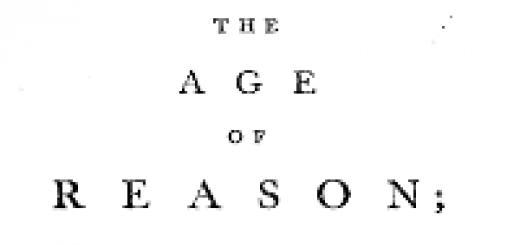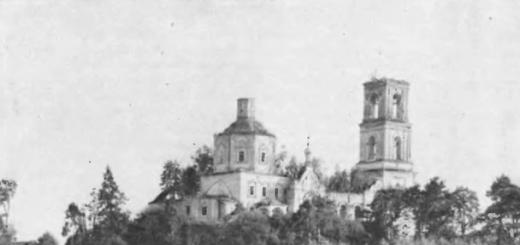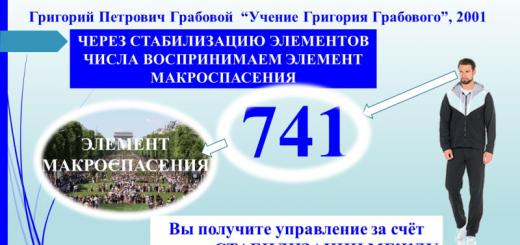Thomas Paine (1737-1809) was close to Jefferson in his political views. He was one of the brightest and most colorful figures of the American Revolution. Paine was not an American by birth; he arrived in the New World when he was already 37 years old. He had a letter of recommendation from Franklin, whom he had met in England. Thanks to his eloquence, he gained some fame, and in 1775, on behalf of Congress, he went to England with a petition from the colonists to George III, but there was no answer to it. Upon his return to America, Paine published a pamphlet "Common sense"(1776). In three months, 120 thousand copies of the pamphlet were printed, which for that time indicated the exceptional popularity of the publication. One New York newspaper said that Paine: "has presented a new system of politics, which is as different from the old as Copernicus's system of views on the universe differs from Ptolemaic's."
The reasons for the success of “Common Sense” lay, firstly, in Paine’s determination: he called for an end to illusions about the English government. Many American politicians at that time still held out hope that it would be possible to achieve fairer relations with the mother country. Paine demanded that the struggle for independence begin immediately, and called George III a “royal animal.” Secondly, he managed to very organically combine religious and scientific imagery in his work. For Paine, Americans are the “chosen people,” and America has a special destiny. Here God replaces the king, and the “word of God” will be embodied in the rule of law in the nascent republic. The author of “Common Sense” also willingly resorts to illustrations from scientific circulation.
So, to prove the absurdity of the situation when an island controls a territory several times larger than itself, Payne turns to Newton’s teaching for an example: “It has never yet been found in nature that satellites were larger than the planets around which they revolve.”
During the war with England, Paine joined Washington's army, and here he wrote 13 pamphlets, which he collected under the title "American crisis"(1776-1783). When the American army found itself in a difficult situation, Washington ordered these pamphlets to be read before the ranks of soldiers to raise morale. Many expressions from this work have become catchphrases.
After the war ended, Paine returned to England, and then, when revolution broke out in France, he went there, declaring: “My home is where there is no freedom.” In France, he became close to such political figures as Lafayette and Condorcet. He was elected to the Convention and became a member of the committee to draft a national constitution. Paine also helped draft the Declaration of the Rights of Man and the Citizen. When the English philosopher and publicist Edmund Burke, who had previously been on friendly terms with Paine, published an anti-revolutionary treatise "Reflections on the Revolution in France"(1790), Paine defended the French Revolution with a pamphlet "Human rights"(1791 - 1792). Burke, in his Reflections, expressed indignation that the French executed their rightful king, who was not distinguished by either cruelty or tyrannical tendencies. Paine, who spoke at the Convention against the execution of Louis XVI, explained that this event was directed not so much against the monarch himself, but against the despotic form of government that the king personified.
The author of “Human Rights” also explains the advantages of the French constitution over the English one. In the French constitution, the interaction between the individual and society is based on the theory of “natural law” and “social contract”. Paine, like many educators, believed that all people are born equal and have “natural rights” common to all. After the “state of nature” stage, people move to the social stage of development, which arises as a result of a consciously and voluntarily concluded “social contract” between individuals. In his interpretation of the “social contract,” Paine is close to the position of Locke, who believed that citizens retain “natural rights,” the protection of which, after the conclusion of the contract, the state undertakes. However, as a result of this, a person also acquires civil rights, i.e. rights belonging to him as a member of society. According to Paine, civil rights are also based on natural rights, but by necessity placed under the jurisdiction of the state. The English constitution is inferior to the French in that it was created not by the people, but by the government, which came to power through the struggle for it.
When the Jacobins seized power in France, Paine was arrested for being on friendly terms with the Girondins. He miraculously managed to escape execution. After the fall of Robespierre, he received his freedom and soon published the pamphlet “The Age of Reason” (1794/95), which he began working on while still in prison. The pamphlet contained many very free statements about religion, which aroused hatred towards it in church circles in both England and America. Therefore, when Payne returned to the USA in 1802, real persecution was launched against him, he was even deprived of the right to vote. In the last years of his life he was constantly persecuted and died in poverty.
Despite the sad circumstances of the final period of his life, Paine's ideas had a lasting influence on the formation of the democratic movement in America, England and France. In Russia, the Decembrists showed interest in his teachings.
One of the most famous documents of early American history, the essay-pamphlet of Thomas Paine (1737-1809) was published anonymously in the colonies in January 1776. Paine called the English King George III a “royal monster” personally responsible for all acts of injustice, perpetrated against American colonists. The 50-page pamphlet, printed in America in a circulation of 120 thousand copies, had a serious influence on the attitude of the colonists towards the British crown and became the most effective tool of anti-British propaganda in the struggle of the American colonies for separation from England.
Thomas Paine
In the following pages I have resorted only to simple facts, understandable arguments and common sense, and have no other intention for the reader than to help him get rid of prejudices and preferences, to allow his mind and his feelings to determine themselves, to encourage so that he would find, or rather would not reject, true human nature and thoroughly expand his views beyond the limits of the present situation.
Numerous volumes have been devoted to the theme of the struggle between England and America. People of all classes dealt with these contradictions, based on different motivations and with different calculations, but it was all to no avail and the period of debate ended. The outcome of the contest is decided by weapons as a last resort: resorting to them was the choice of the king, and the Continent accepted this challenge.
Solnia has never seen a more noble goal. This is not the business of a single city, county, province or kingdom, but of the entire Continent - at least one-eighth of the inhabited part of the globe. This is not the concern of one day, one year or one century; future generations are actually involved in the confrontation, and they will, to one degree or another, be influenced by the current events almost until the very end of life on Earth. Today is the time for the birth of the Continental Union, faith and honor. The slightest break today will be like a name carved with the tip of a pin on the tender bark of a young oak tree; the wound will increase as the tree grows, and the name will appear before posterity in large letters. The transition from negotiations to weapons marked the beginning of a new political era - a new way of thinking emerged. All plans, proposals, etc., relating to the period before the nineteenth of April, that is, before the outbreak of hostilities, are similar to last year's calendar, which, being timely then, has become unnecessary and useless today. Everything that was put forward then by defenders of opposing points of view. came down to the same thing, namely, an alliance with Great Britain. The only difference between the parties was the method of achieving it: one of the parties proposed to resort to force, the other proposed to be friends; but it so happened that today the supporters of the first path have been defeated, and the supporters of the second have lost their influence.
I have heard some assert that, just as America prospered under her former connection with Great Britain, so a similar connection is necessary in the interest of her future happiness, and will always be so necessary. Nothing could be more fallacious than an argument of this kind. We may just as well assert that if a child has been raised on milk he should never be given meat, or that the first twenty years of our life are destined to become the model for the next twenty years. But even these statements imply a distortion of the truth, and I immediately answer that America would prosper just as much, and perhaps to a greater extent, if no European power paid any attention to it. Trade, by which she has enriched herself, is a necessity of life, and she will always have a market, while consumption is the habit of Europe.
But she protected us, some say. It is true that it has consumed us; it is also recognized that she defended the Continent at our and her own expense, and that she would defend Turkey based on the same considerations, namely for the sake of trade and dominion.
Alas! We have been mistaken for a long time, shackled by ancient prejudices and made enormous sacrifices to superstitions. We boasted of the defense of Great Britain, without realizing that she proceeded from her own interests, and not from affection for us; that she defended us from our enemies not for our sake, but from her enemies for the sake of her own interests, from those who did not quarrel with us for any other reason and who will always be our enemy for the same reason. Let Great Britain renounce her claims to the Continent, or let the Continent shed its dependence; and we will live in peace with France and Spain, even if they find themselves at war with Great Britain.
It has recently been asserted in Parliament that the colonies are connected with each other only through the mother country, that is, that Pennsylvania and Jersey, like all the others, are sister colonies through England. This, of course, is a very indirect way of proving a relationship. but the most direct and sure way of proving enmity or hostility, if you can call it that. France and Spain have never been and. may never be our enemies - the enemies of the Americans, but only our enemies as British subjects.
But Great Britain is our ancestor, some say. Moreover, she should be ashamed. Even wild animals do not eat their young, and savages do not fight with their families... Europe, not England, is the mother of America. The New World became a refuge for persecuted advocates of civil and religious freedom from all parts of Europe. They fled here not from the tender embrace of their mother, but from the cruelty of the monster. As for Great Britain, then, as before, this tyranny, which expelled the first emigrants from their homes, still haunts their descendants.
But even accepting that we were all of British origin, what do you mean by this? No. Great Britain, being a clear enemy, excludes any other name or definition: the claim that reconciliation is our duty sounds like a farce. The first king of England of the present dynasty (William the Conqueror) was a Frenchman, and half the peers of England are natives of this country. Following the same logic, England should be ruled by France. Much was said about the combined power of Great Britain and the colonies, that together they could challenge the whole world. But these are mere assumptions; the outcome of the war is uncertain, and all these statements mean nothing, since our Continent will never agree to sacrifice its population to support British arms in Asia, Africa or Europe.
And besides everything else, why should we challenge the whole world? Our plans include trade, and if it is organized wisely, it will ensure us peace and friendship with all the peoples of Europe, since it is in the interests of all Europe to have an open port in America. Her trade will always be a protection, and her lack of deposits of gold and silver will protect her from invaders. I challenge the most ardent advocate of reconciliation to name one piece of evidence of the benefit which our Continent will derive from remaining connected with Great Britain. I reiterate that there will be no benefit from this. Our corn will get its price in any market in Europe, and the goods we import must be paid for no matter where we buy them.
However, the damages and losses we suffer as a result of such communication are countless. Our duty to all mankind and to ourselves obliges us to renounce the alliance, since any submission or any dependence on Great Britain entails a direct interference of our Continent in European wars and quarrels and involves us in conflict with states which would otherwise seek our friendship and towards whom we bear neither malice nor discontent. Since Europe is our market, we should not establish partial relations with any particular part of it. It is in America's true interest to keep aloof from European strife, which it will never succeed in, while by remaining dependent on Great Britain it becomes a weight in the scales of British politics.
It is disgusting to argue, advanced with reference to the universal course of events, to all sorts of examples from past centuries, that our Continent can remain dependent on any foreign power. Britain's biggest optimists don't think so. Today, even the wildest imagination is unable to propose a plan, short of secession, that would ensure the security of our Continent for at least one year. Reconciliation now seems like a pipe dream. Naturalness has ceased to be a justification for a new connection, and artificiality cannot take its place. As Milton wisely observed, “true reconciliation will never arise where such deep wounds of mortal hatred exist.”
It is crazy and stupid to talk about friendship with those whom our reason forbids us to trust and our disposition towards whom, deeply wounded, forces us to hate them. Every day the last remnants of kinship between us and them disappear. And can there still be hope that as relationships fade, mutual sympathies will increase, or that we will be more successful in reaching agreement as the number of reasons for quarrels increases tenfold and the complications of relationships become more serious than ever before? .
You, who tell us about harmony and reconciliation, can you return to us bygone times? Is it possible to restore lost innocence to a prostitute? Likewise, you cannot reconcile Britain and America. The last thread has been severed, the people of Great Britain are presenting a bill to us. There are wounds which nature cannot forgive; she would cease to be nature if she did this. Just as a lover cannot forgive a rapist for violence against his beloved, our Continent cannot forgive Britain for murder.
O you who love humanity! You who dare to resist not only tyranny, but also the tyrant, take a step forward! Every inch of the old world is under oppression, suppressed. Freedom is being pursued across the globe. Asia and Africa have long ago driven it out. Europe considers her a stranger. and England gave her a warning before he was expelled. her. Oh, receive the exile and prepare to become in time a refuge for humanity
Paine Thomas (January 29, 1737, Thetford - June 8, 1809, New York) - revolutionary thinker, social and political figure in Great Britain, the USA and France, representative of the revolutionary wing of the 18th century enlightenment.
Thomas Paine - a native of the people, a revolutionary and social and political figure, publicist, progressive thinker and encyclopedist-scientist - left a noticeable mark on the philosophy of the American Enlightenment.
The views of Paine, the most consistent representative of the radical democratic trend in the American socio-political movement of the late 18th century, had a direct influence on the formation of the ideology of the Chartist movement in Great Britain.
1. Childhood and youth
Born in England in the family of a poor artisan. Due to need, he was forced to quit school at the age of thirteen and start helping his father in the workshop, but after five years he left the family, making attempts to get out of his disastrous financial situation. He was a sailor, a corset maker, a teacher, a tax collector... - while constantly educating himself.
2. Social activities
2.1. Great Britain
In 1772, Paine first appeared as a public figure: at the request of his comrades, he wrote an appeal to parliament, outlining the complaints of excise officials about their difficult lot. As a result, the excise bureau dismisses the restless official, and in 1774 Payne comes to London in search of work, where he meets Franklin, with whose assistance he goes to the United States of America.
2.2. North America
Payne arrives in the American colonies on the very eve of their struggle for independence, and with the outbreak of the war he becomes involved in active revolutionary activities: in 1775 he edits the Pennsylvania Journal newspaper, promoting radical views - the abolition of the monarchy, slavery of blacks, etc., and in At the beginning of 1776, he published the pamphlet “Common Sense,” where he convincingly argued for the need for a war against England for the independence of its American colonies and called on the people to take up arms. In the summer of the same year, Payne volunteered for the American revolutionary army.
During the war years, Paine wrote a number of vivid revolutionary pamphlets under the general title “The American Crisis,” directed against the English monarchy and in defense of the young American republic.
In 1777 - 1779 Paine is secretary of the Congressional Foreign Relations Committee, and in 1781 he participates in Paris in negotiations with the French government on assistance to the North American colonies.
After the war, Paine continued to publish on social and political issues, while turning to scientific pursuits and invention.
2.3. France
In 1787, Payne traveled to France and then to England, hoping to find funds to build the single-arch iron bridge he designed. From London, Payne often travels to Paris, where in the house of the American Ambassador Jefferson he meets with prominent figures of the French Enlightenment.
With the beginning of the French bourgeois revolution, Payne immediately came out in its defense: in 1791 - 1792. he publishes the pamphlet “Human Rights”, where he explains the events of the French Revolution. At the end of 1792, the English government accused Paine of plotting against the monarchy; a lawsuit begins against him. Declared an outlaw in England, Paine flees to France to escape arrest. In the same year, the legislative assembly granted Paine, as an outstanding revolutionary, French citizenship, and he was elected as a deputy to the convention.
With the Jacobins coming to power, Payne's position worsens (in particular, he disagrees with them on the issue of the execution of Louis XVI). The intrigues of his political and ideological opponent, US Ambassador to France Morris, as well as the Jacobins’ condemnation of Paine’s connections with the Girondins also play a role. In December 1793, Paine was arrested under the Enemy Alien Act, which targeted the British. He spends over ten months in prison and is only accidentally saved from execution by the guillotine. The result of Payne's activities in France was the development of his social views in the field of criticism from the petty-bourgeois positions of bourgeois property relations. Finally, Paine, one of the pioneers of the atheistic tradition on American soil, writes the first part of his work against religion and the church, The Age of Reason, and then publishes Agrarian Justice.
2.4. Return to the USA
In 1802, only after Jefferson assumed the presidency, Paine managed to return to the United States. However, during the fifteen years of his absence from the United States, the situation in the country changed significantly: the dominance of capital was fully established in the republic, and the revolutionary democratic ideals, which the ruling circles began to change during the war, were largely consigned to oblivion. In an atmosphere of struggle between progressive and reactionary forces, grouped around two parties - Republican and Federalist, Paine's arrival could not go unnoticed. Large property owners and their Federalist Party greeted Paine with open hostility. His radical philosophical and political ideas were contrary to their views and beliefs. On the contrary, Republicans and progressive groups of American deists find in him a militant propagandist of their ideas.
In addition, Paine's political and social views outrage the dominant bourgeois plantation circles in America. Particularly dangerous for them are Paine’s calls for the elimination of inequality in property, which he makes in Agrarian Justice. Paine, although he did not go as far as the Babouvists on this issue, “objectively justified the uprising for the purpose of eliminating social inequality in relation to property” (Foner).
In America, Payne writes works, the material of which was intended for the third part of “The Age of Reason” and which saw the light only after the death of the author.
Payne, persecuted by enemies and slanderers who defame him, is ready to leave the United States, but his health does not allow him to do so. Bedridden and forgotten by his former friends, Payne dies in poverty. Two and a half months before his death, he asks the Quaker community for permission to be buried in its cemetery. His request is denied.
3. Main scientific and socio-political works
3.1. Common Sense (1776)
An anonymous pamphlet arguing for the necessity of the American colonies' war for independence. Based on the rationalistic theories of natural law and social contract, Paine defends the idea of the sovereignty of the people and their right to revolution, argues for the need for the North American colonies to break with Great Britain and form an independent republic.
Paine makes a clear distinction between the wars, pointing to the American Revolution as an example of a just act: “their cause is just,” Paine writes, and therefore they must “in good conscience take up arms” to free themselves from the coercion of the English crown and obedience. to her.
The ideas of the pamphlet were reflected in the US Declaration of Independence of 1776.
3.2. American crisis (1776 - 1783)
During the War of Independence in North America, during the difficult days of the retreat of American troops from the Hudson to the Delaware, Paine, to maintain the spirit of the soldiers, wrote the pamphlet “The Crisis”, in which, branding the English king and his American supporters (Tories), he expressed confidence in victory.
The first pamphlet was followed by a whole series of similar ones (16 in total), which Paine wrote and published throughout the war, promoting the American Revolution. In these proclamations, the name of the new state being created was first heard - “The United States of America”.
These articles were reprinted by newspapers that campaigned for American independence; by order of Commander-in-Chief John Washington, they were read aloud to the soldiers of the liberation army. The significance of this series of pamphlets is not limited to explaining the immediate goals of the war, calling for the unification of the forces of all Americans, exposing the Tories as traitors, and providing detailed information about the progress of military operations - in them Paine continues to explain his political views.
3.3. Human rights (1791 - 1792)
A pamphlet in which Paine explained the events of the French Revolution, condemning the monarchy and exposing the apologist for the English crown, Burke, who slandered the revolution. Defending the revolutionary principles of the French Declaration of the Rights of Man and Citizen, Paine developed the ideas of popular sovereignty and republicanism. In Britain the essay was banned and publishers were put under pressure.
3.4. Age of Reason (1794 - 1795)

Title page of the first English edition of the first part of The Age of Reason, 1794
In this essay, Paine expressed the anti-religious sentiments of his era, contrasting scientific knowledge with ignorance and the preaching of religious retrogrades. However, Paine's spontaneous materialistic views did not receive deep development: philosophical problems, as such, were not the object of his special study, and he addressed them only in connection with criticism of widespread religious views.
The lack of necessary philosophical training could not but affect the author’s position, weakening it. Paine's philosophy is characterized by inconsistency and deviations from materialism. The mechanical, metaphysical approach explains why Paine was unable to escape the captivity of deism. Defending at the end of the 18th century. the already outdated Newtonian idea of the first impulse, in this respect he was inferior to Toland, Holbach and other materialists of the 18th century, who long before the “Age of Reason” overcame deistic ideas about God as the first cause.
Having examined the internal inconsistency of the story of the legendary Christ contained in the gospels, Paine comes to the conclusion that the New Testament is not authoritative. He is trying to find out the social prerequisites for the emergence of Christianity. Assuming the existence of a historical Christ, he sees in him a man who intended to free the Jewish people from Roman dependence and the domination of the Jewish priests. He also believes that it was in the popular environment that ideas about “saviors” arose, whose names acquired “the widest popularity,” and that the founders of the Jewish, Christian and Muslim religions came from a democratic environment.
The first part of the work was written in 1793, the second in 1794, in a Luxembourg prison, completed after the release of the author. The third part included the works "The Origin of Freemasonry" (1805) and "Predestination", which condemned the Calvinist doctrine of predestination, written by Paine shortly before his death.
The Age of Reason was attacked not only by reactionaries of all stripes, but Priestley also spoke out against it, arguing that Paine’s attacks on Christianity were not convincing, since enlightened Christians no longer believed in such absurd dogmas as, for example, the Trinity, and there was no reason to discredit Christianity based on such dogmas. And Rush, with whom Paine maintained friendly relations, in turn declared that “the principles proclaimed in his ‘Age of Reason’ are so unacceptable to me that I do not wish to renew communication with him.”
The Rev. E. Ogden, in his anti-Paine pamphlet, An Antidote to Deism, warned: “What can be expected when religious restrictions are removed, except that men will give in to the impulses of their passions? Human laws and punishments will be insufficient to restrain people from their vicious lusts where there is no real religious feeling - no premonition of another world, retribution, sinfulness and the otherworldly Creation of virtue. The ethics of the Enlightenment was guided by the exact opposite conviction: it did not need either religious foundations or religious sanctions - intimidation and illusions.
3.5. Agrarian Justice (1797)
A political-economic work in which Paine, deeply convinced that “revolution in the very state of civilization is an integral concomitant of revolution in the system of government,” develops the bold but utopian idea of eliminating wealth inequality, dividing society into rich and poor while preserving the existing social -economic system. The specific plan he developed for the implementation of this idea boiled down to the payment of rent by the owners and the creation of a fund from it for compensation of the landless, as well as for pensions for the elderly.
According to Paine, wealth and poverty are not eternal phenomena. They are a violation of the natural right of people: “...poverty is a phenomenon generated by the so-called civilized way of life, and does not exist in a natural state.” Paine fights against the inequality in the distribution of wealth that violates natural law, and constantly repeats: in championing the cause of the disadvantaged, “I seek not mercy, but right, not generosity, but justice.”
Under the influence of the physiocrats and the highly regarded Adam Smith, Paine explored the sphere of production, rather than circulation, in order to find the real source of wealth. He condemns the system of distribution of property and makes a guess about the labor of workers as a source of capitalist profit: “... the accumulation of movable property is in many cases the consequence of too little payment for the labor that created this property, as a result of which the worker faces a terrible old age, and the entrepreneur wallows in luxury.” .
,Introduction
Thomas Paine, also Pan (eng. Thomas Paine; January 29, 1737 (17370129) - June 8, 1809) - Anglo-American writer, philosopher, publicist, nicknamed the “Godfather of the USA.” First arriving in America at the age of 37, Paine supported secessionist sentiments in his popular pamphlet Common Sense (1776). In his treatise “The Rights of Man” (1791), he substantiated the French Revolution from the perspective of the Enlightenment, for which he was elected to the Convention in 1792 (although he did not speak French). In 1794, he wrote the most important philosophical work, “The Age of Reason,” imbued with the ideas of deism and belief in the triumph of reason.
1. Biography
English by birth; comes from a poor Quaker family. His education was limited to the local school, where he did not even learn Latin. As a young man, Payne worked in the excise office. Knowing his ability to speak, his superiors asked him to write a petition for a salary increase. He wrote a letter to the government, for some reason they did not re-read it and sent it. In it, Payne wrote with childlike spontaneity: “Please increase our wages, otherwise our wages are so low that we have no choice but to take bribes.” And he described in detail who takes, when and how much. After this, the entire excise office was sent to court. However, Paine himself managed to escape, boarded a ship and arrived in America in 1774, with a letter of recommendation from Franklin, whom he met in England. This was just before the United States broke with England. At a huge meeting held on this occasion, Paine described the then government of England in the darkest colors, assured that no good would come from it, and advised the Americans to declare independence.
Pamphlet "Common Sense"
In 1775, Paine, on behalf of Congress and the senator, took the colonists' petition to the king to England. This request remained unanswered, and Paine returned to America, where he published the pamphlet “Common Sense,” in which he argued that every nation has every right to arrange for itself the government it likes. According to Washington, Paine's pamphlet produced a revolution in minds. After the Declaration of Independence was written and war broke out between England and the United States, Paine went to Washington's camp and began publishing the newspaper American Crisis, supporting the courage of the small American army. One of his articles was, by order of John Washington, read to the troops instead of the day's order, and so inspired the soldiers that, rushing into battle with the British, they repeated the initial words of Paine's article: “The time has come to test the strength of the human soul!” .
Thanks to his published works, Paine became the most popular person in America, after George Washington. In 1780, when Charleston was taken by English troops and Washington found itself in the most desperate situation, to cover emergency military expenses, Paine proposed a national subscription, and the first subscribed for $500. In 1781, Paine was sent by the American government to Paris to negotiate a loan, and completed this assignment successfully.
At the end of the war, Paine returned to England. Paine, along with Burns and Wordsworth, hailed the French Revolution in 1789 as the dawn of freedom for all mankind. When Burke published his Reflections on the French Revolution in 1790, Paine countered with a lengthy pamphlet, Rights of Man, in which he defended the natural rights of man. According to Paine, a person enters into a social union not to diminish his natural rights, but to ensure them; ceding part of his rights in the interests of society, he reserves for himself freedom of thought, freedom of religious conscience and the right to do everything for his own happiness that does not harm others. While arguing with Bork on this issue, Paine passionately defends the new French constitution, which gives the right to vote to everyone who pays even the most insignificant tax, and gives an evil characterization of the English constitution, which is all aimed at giving the king the means to bribe his subjects. Touched to the quick, the government decided to prosecute the author of the brochure.
In May 1792, Paine was put on trial on charges of insulting the king and the constitution. Payne was unable to attend the trial; elected a member of the national convention, he lived in Paris, entrusting the defense of his book and person to the famous lawyer Thomas Erskine. Despite Erskine's brilliant speech, which aroused the enthusiasm of the youth, the jury found Payne guilty. Unable to imprison the author of the pamphlet, the government persecuted all those who could find it. As a member of the convention, Paine was a supporter of the Girondins and always voted with them. In the trial against the king, he advocated the expulsion of Louis XVI and warned the assembly that the execution of the king would be a huge political mistake, and would make an extremely unfavorable impression in America, where Louis XVI was very popular. Instead of execution, he advised sending the king into exile in America; there he will see “how the public welfare increases under a republican government founded on liberty and on fair representation.”
The Montagnards could not forgive Payne for his intercession on behalf of the king; after the fall of the Girondins, he was arrested, sentenced to death and was saved only by a stroke of luck. During his imprisonment, Paine wrote his once famous essay: The Age of Reason, in which he tried to apply the techniques of rationalist criticism to the explanation of the Bible.
In 1804 Paine went to America. President Jefferson, remembering Paine's services to the cause of American freedom, placed an entire ship at his disposal. Thinking that he would now be received with enthusiasm, Paine was cruelly mistaken in his calculations. The "Age of Reason" armed the religiously inclined American society against it; Incited by the clergy, his former friends turned away from him. He could not bear this, and began to seek solace in wine.
Payne died in New York, abandoned by almost everyone, but calm, with the comforting knowledge that he had not lived his life in vain. “My life,” he wrote to one of his friends a few days before his death, “was useful for humanity; “I did good as much as I could and I die calmly, hoping for the mercy of the Creator.”
2. Views of T. Payne
In religious views, Paine was a follower of the English deists; his goal was to shake, as he put it, biblical and Christian mythology. In 1795, Paine published a short treatise summarizing his political beliefs.
In 1797, as a counterweight to the society of atheists, he founded a theophilanthropic circle, in the meetings of which he outlined the foundations of his religion, cleared of superstition.
Paine was a typical representative of both political and religious rationalism. No one trusted the human mind as much as he did. He was self-taught, did not know much, and therefore often spoke naivety, which was quickly picked up by his enemies. There is no doubt, however, that he was distinguished by common sense, strong logic and remarkable clarity of presentation. He was a people's tribune in the full sense of the word, not only because he knew how to speak in a language understandable to the people, but also because the guiding idea of his life was serving the people. To Franklin’s famous expression: “My fatherland is where freedom is,” Paine made the following amendment: “My fatherland is where there is no freedom, but where people fight to get it.” These words are his best characteristic.
Analyzing the forms of the state, Paine distinguished between “old” (monarchical) and “new” (republican) forms. This classification was based on the principles of board formation - inheritance or election. He called government based on the transfer of power by inheritance “the most unjust and imperfect of all systems of government.” Lacking any legal basis, Paine argued, such a power was inevitably tyrannical, usurping popular sovereignty. Absolute monarchies "are a disgrace to human nature."
3. Essays
The complete works of P. (“Writings of Th. P.”, collected and edited by Moneure Conway) were published in New York in 1895.
Payne T. Selected Works. M., 1959.
Literature
Vale, "The Life of Thomas P." (New York, 1842);
Moneure Conway, "The Life of P." (London, 1893).
Voronov V.V. Progressive trends in the sociological views of Thomas Pan // Philosophical Sciences, 1959, No. 3.
Goncharov L.N. Socio-political ideas of T. Payne. Frunze, 1959.
Gromakov B.S. Political and legal views of Thomas Paine. M., 1960.
Goldberg N.M. Thomas Paine. M., 1969 (Library "Thinkers of the Past").
Fast G. Citizen Tom Payne / Novel; translation from English M.Kan. M.: Terra. 1997.
Documents Thomas Paine - "Common Sense" Links
Godfather of the United States, Seagull Magazine
Rukshina K. Why America didn't accept Thomas Paine
Rukshina K. Thomas Paine (1737-1809) and the birth of modern democracies. Part 1, part 2, part 3 and part 4.
Bibliography:
These are the times that try men’s souls
Raise our salaries, otherwise we are forced to take bribes
Paine came from a poor family of Quakers (who were part of the 13 colonies). The publicist's youth was joyless: a local mediocre school, poverty - Payne worked in a workshop and then in an excise office, his wife died in childbirth.
Payne turned in the bribe takers, but he himself had to flee
However, his future fate is connected with work in the office. It all started at the moment when Payne was asked by his superiors to write a petition for a salary increase. They knew he was eloquent. Payne wrote. In his own way, with childish spontaneity, but he wrote it. They didn’t start proofreading, but in vain. In the petition, Payne wrote: “Please increase our wages, otherwise our wages are so small that we have no choice but to take bribes.” And then he described in detail who, when and how much.
Thomas Paine, circa 1791
Naturally, the entire excise office was sent to trial. But Payne himself managed to escape. He boarded a ship and arrived in America in 1774 with a letter of recommendation from Benjamin Franklin, another future man. He met him in England. Paine was in some ways lucky - he arrived some time before the break with the British Empire.
Paine almost immediately became a supporter of the American Revolution
At a huge meeting dedicated to the imminent declaration of independence, Paine, who had just fled persecution in England, described the then government of England in the darkest terms. There was no point in expecting any good from the government of the Whig exploiters, and these were precisely the views held by the founding fathers. Paine advised the colonists to declare independence.
You urgently need a revolution!
It is believed that every second family in the colonies had Paine's pamphlet
Arriving in the American colonies, Thomas Paine, under the patronage of Franklin, went into business. He invested in risky projects, mainly related to the construction of bridges. Paine viewed them as a remarkable "invention of mankind to master nature without disturbing her power or destroying her beauty." It is noteworthy that the project of a bridge across the Schuylkill in Philadelphia, prepared by him in 1787, was implemented only 9 years later, and then in Sunderland, England.

"Friends of Men", caricature by Isaac Cruickshank. Joseph Priestley and Thomas Paine (right)
In 1775, Paine, on behalf of the Continental Congress, took the colonists' petition to the king to England. The request remained unanswered, but Paine returned to America, where he published the brochure “Common Sense.” Addressed to the people of America, the pamphlet convinced that every nation had every right to establish its own government. According to George Washington, Thomas Paine's pamphlet revolutionized minds. Paine debunked the colonists' hopes for the king's intercession and declared monarchy an unnatural form of government.

“Fashion before retrenchment, or Good Constitution sacrificed to Beautiful Form” (1793). Cartoon by James Gillary. Thomas Paine tightens Britain's corset
Paine drew plenty of examples of incompetent and worthless monarchs from the main book of religious colonies - the Bible, and specifically the Old Testament. It is believed that every second family in the colonies owned a copy of the pamphlet. This makes it the most successful book of the New World. The unprecedented success of the text was also facilitated by the fact that Paine renounced copyright - the brochure was distributed almost free of charge. “Common sense” prepared the colonists for the final break with the mother country.
Thanks to his articles, Paine became the most popular publicist in the colonies.
Thomas Paine is also credited with authoring the anonymous article "African Slavery in America." This was one of the first texts to present the ideas of abolitionism. And it was under his influence that the first abolitionist society in America was created (Benjamin Franklin, by the way, freed the slaves).
America's Second Man
After drawing up the Declaration of Independence and the outbreak of war with England, Paine went to Washington's camp. Tried to be a soldier, but he didn't do well. But he wrote a series of 13 pamphlets, “The American Crisis,” which inspired his colleagues. One of the articles, by order of General Washington, was read to the troops instead of an order. The article inspired the soldiers so much that, rushing into the attack, they repeated: “The time has come to test the strength of the human soul!” - Payne’s text began with these words.

Siege of Charleston
Thanks to his published works, Paine became the second most popular person in the 13 colonies, after George Washington. In 1780, the British captured Charleston, South Carolina. Washington found itself in a desperate situation. Paine, to cover emergency military expenses, proposed a national subscription and was the first to contribute $500. The following year, Paine was sent to Paris to negotiate a loan, which Paine did brilliantly.
Paine at the Convention: British French Revolutionary
When the Revolutionary War ended, Paine returned to England. Soon, in 1789, a revolution broke out in France. Paine, like Burns and Wordsworth, hailed it as the dawn of freedom for all mankind. This is not surprising - France was, and that revolution was compared mainly with the one that took place at the beginning of the century, which passed almost bloodlessly for England itself, which cannot be said about Scotland, for example.
In 1790, Edmund Burke published Reflections on the French Revolution; Paine countered with his extensive pamphlet, The Rights of Man. It defended natural, innate human rights. According to Thomas Paine, a person enters into a social contract not to diminish rights, but to ensure them. Conceding part of his rights in the interests of society, he reserves freedom of thought, conscience and the right to do everything for his own happiness that does not harm others.

Trial of Louis XVI
In his polemic with Burke, Paine passionately defended the new French constitution, which gave the right to vote to everyone who paid even the most insignificant tax, and fiercely criticized the English (unwritten) constitution. The English device was aimed at giving the king the means of bribing his subjects. The government was, to put it mildly, not happy with this characterization and decided to prosecute the author of the brochure.
Thomas Paine, British subject, elected to the French Convention
Two years later, Payne was put on trial, accused of insulting the king and the constitution, but the authorities were too late. Thomas had already been in Paris for a long time. Not being a French citizen, he was elected to the National Convention. Unable to attend the trial, he entrusted the defense of his books and personality to the lawyer Thomas Erskine. He made a brilliant speech that excited the youth, but, alas, the jury was not impressed enough and found Payne guilty. However, it was impossible to punish the rebel, so the government decided to prosecute everyone who could find a copy of the brochure.
Almost headless
As for Payne, in the Convention he was a supporter of the Girondins and always voted with them. In the trial against the king, he was in favor of the expulsion of Louis XVI and warned everyone that the execution of the king would be a huge political mistake, causing an unfavorable reaction among the allies in the United States, where Louis was very popular due to his assistance during the revolution. Instead of execution, Paine proposed exiling Louis XVI to America, where he would see “how the public welfare grows under a republican government based on liberty and fair representation.”
The US did not stand up for Payne when he was threatened with the guillotine
At the same time, it was clear to Paine that the mighty English nation would also have a negative reaction. Before the execution, the British were generally lenient towards the revolution in France - they themselves experienced this twice. But they thought that everything would be like during the Glorious Revolution. We were wrong.

The Montagnards could not forgive Payne for his intercession on behalf of the king. After the fall of the Girondins, Payne was expelled from the Convention as a foreigner, arrested and sentenced to guillotine. The literally elusive Payne was saved only by chance. During his imprisonment in France, he wrote the famous "Age of Reason." Apparently, French prisons somehow contribute to writing. But, jokes aside, an essay was published that contained methods of rationalistic criticism and explanation of the Bible. Importantly, Payne was not an unbeliever, of course. However, he opposed the institutionalization of faith.
Paine miraculously escaped execution and lived to see Thermidor
So, Payne escaped death by the will of God, chance, or simply human stupidity or inattention - whatever. The fact is that special marks were left on the doors of the dungeons of everyone who was to be executed. But Payne was lucky - the mark on his door was left on the inside of the door! The fact is that his cell was often open due to the large number of visitors. And the jailer, apparently, simply did not pay attention to which side he was applying the droppings to. As a result, Payne spent a little more time in prison - until the Thermidorian coup and the fall of Robespierre. He was released and sailed to the States allied with France. Who, by the way, did not stand up for Payne in any way, but all they had to do was recognize him as their citizen...
The forgotten “atheist” in religious society
Accepted as a God-fighter, Paine remained a believing deist
In 1804, Paine returned to America. The then President Thomas Jefferson, remembering Paine's services in liberating the colony, placed an entire ship at his disposal. Thomas Paine, returning to the New World, thought that he would be greeted with delight, remembering past deeds. However, he was wrong. The "Age of Reason" armed the religiously minded American society, incited by the clergy, against him. Even his former friends turned away from him. Payne could not bear the total loneliness; he had no one. He started drinking.
Thomas Paine died on June 8, 1809 in Greenwich Village, New York. Almost everyone abandoned him, but he was calm. I am consoled by the fact that I did not live my life in vain. “My life,” he wrote to one of his friends a few days before his death, “was useful for humanity; “I did good as much as I could and I die calmly, hoping for the mercy of the Creator.”
6 people attended the funeral of the once popular publicist
Paine wanted to be buried in a New York Quaker cemetery, but the local congregation refused to provide a place for the “godless one.” Payne was buried under a chestnut tree on the farm he owned. Only 6 people (including 2 black servants) were present at the funeral of the once most popular man in America.

Statue of Thomas Paine in his native Thetford, England
In 1819, the English radical publicist William Cobbett dug up Paine's remains and transported them to the revolutionary's homeland, intending to ensure a proper burial for the "great son of England." It didn't work out for him. The fate of Payne's ashes after Cobbett's death is a mystery. Many then claimed to have the skull or other skeletal part of one of the founders of the United States.










